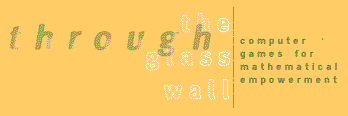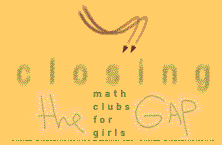
 Popular culture offers little out-of-school support for children's mathematical
learning, with one potential exception--computer games. While many of
the more recent games purport to be"educational", and to "promote
children's mathematical learning", there is little research to support these
claims. How do children learn significant mathematics from computer
games? What are the characteristics of games, and of game-playing contexts,
that interact with learning? Why are the children who play electronic games
predominantly male? How might we understand and address this out-of-
school inequity in girls'and boys' exposure to technology and mathematics?
Popular culture offers little out-of-school support for children's mathematical
learning, with one potential exception--computer games. While many of
the more recent games purport to be"educational", and to "promote
children's mathematical learning", there is little research to support these
claims. How do children learn significant mathematics from computer
games? What are the characteristics of games, and of game-playing contexts,
that interact with learning? Why are the children who play electronic games
predominantly male? How might we understand and address this out-of-
school inequity in girls'and boys' exposure to technology and mathematics? This project will examine the intersection of gaming, mathematics knowledge, and gender, with particular attention to differences in the ways girls and boys engage in computer games that involve mathematical thinking. The eventual goal of the project is to understand enough about the interactions among these three fields to influence the design of computer games so that they will be at least as appealing to girls as to boys.
Funded by the National Science Foundation, Research in Teaching and Learning.

It is well documented that girls, by the time they reach middle school, become less interested in mathematics and less confident in their mathematical ability than their male counterparts. In fact, 82% of middle school girls do not see themselves as strong mathematical thinkers (Sadker & Sadker, 1994). This downward slide in confidence can restrict opportunities, both intellectual and economic, for young women. Research also documents that strong female role models and single sex academic experiences contribute to girls' higher achievement in mathematics and more positive attitudes about math (AAUW Report, 1992).
If the fact that girls can and do lose interest in mathematics is faced squarely, and students of both genders are included in the conversation about why this happens and what the ramifications can be, we believe the problem can be alleviated. Our experience demonstrates that math clubs for girls at the upper elementary level is an intervention that does make a difference. In order to build models for these clubs that can be replicated nationally, we are establishing both inner city and rural school-based math clubs for girls, to uncover the challenges and possibilities of both settings.
While the structure of each club varies, the fact that all are school-based ensures that everyone can participate, not just those girls whose parents are motivated to enroll and transport them. Clubs are led by classroom teachers with support from community or business partnerships. Community members who do math in their work become involved with the whole class and act as role models for all students.
Club activities are chosen to enhance and enrich the mathematics that transpires in the regular class. Since many activities are selected from the Investigations in Number, Data and Space curriculum, an innovative K-5 program developed at TERC with support from the National Science Foundation, teachers are able to explore areas of mathematics which have not traditionally been part of the elementary program, and which may be new to them. What they learn may then be brought back to the regular classroom.
Parents, especially mothers, are encouraged to participate in the clubs and to support their daughters as mathematical thinkers. Girls bring math games home on a regular basis to play with family members and then bring their families back to school for a celebration in which they share their work in mathematics.
Although this model differs in several ways from other single gender learning environments, the most important difference is that female students, after spending time in a situation in which their voice is the only voice, and the access to materials and adults is unlimited, can then return to the dual gender realm of the classroom with renewed confidence. Boys benefit too as they need to readjust their expectations in order to deal with these confident, strong, female math thinkers. We will be documenting the challenges and successes experienced by our model clubs and at the end of the project, will publish a guide designed for use by parents, teachers, and administrators interested in developing similar programs.
Funded by the National Science Foundation.